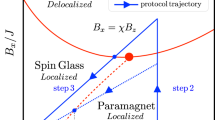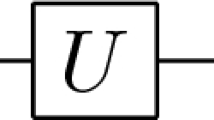Abstract
Grover’s algorithm can be employed in global optimization methods providing, in some cases, a quadratic speedup over classical algorithms. This paper describes a new method for continuous global optimization problems that uses a classical algorithm for finding a local minimum and Grover’s algorithm to escape from this local minimum. Such algorithms will be useful when quantum computers of reasonable size are available. Simulations with testbed functions and comparisons with algorithms from the literature are presented.


Similar content being viewed by others
Explore related subjects
Discover the latest articles, news and stories from top researchers in related subjects.References
Floudas, C., Gounaris, C.: A review of recent advances in global optimization. J. Glob. Opt. 45, 3–38 (2009)
Baritompa, W.P., Bulger, D.W., Wood, G.R.: Grover’s quantum algorithm applied to global optimization. SIAM J. Opt. 15, 1170–1184 (2005)
Bulger, D.W.: Combining a local search and Grover’s algorithm in black-box global optimisation. J. Opt. Theory Appl. 133, 289–301 (2007)
Liu, Y., Koehler, G.J.: Using modifications to Grover’s search algorithm for quantum global optimization. Eur. J. Oper. Res. 207, 620–632 (2010)
Liu, Y., Koehler, G.J.: A hybrid method for quantum global optimization. J. Glob. Opt. 52, 607–626 (2011)
Protopopescu, V., Barhen, J.: Solving a class of continuous global optimization problems using quantum algorithms. Phys. Lett. A 296, 9–14 (2002)
Protopopescu, V., Barhen, J., et al.: Quantum algorithm for continuous global optimization. In: Qi, L. (ed.) Optimization and Control with Applications. Springer, New York (2005)
Dürr, C., Høyer, P.: A quantum algorithm for finding the minimum, http://lanl.arxiv.org/-abs/quant-ph/9607014, (1999)
Boyer, M., Brassard, G., Høyer, P., Tapp, A.: Tight bounds on quantum searching. Fortschritte der Physik 46, 493–506 (1998)
Bulger, D.W.: Quantum basin hopping with gradient-based local optimisation. arXiv:quant-ph/0507193 (2005)
Jordan, S.P.: Fast quantum algorithm for numerical gradient estimation. Phys. Rev. Lett. 95, 050501 (2005)
Grover, L.K.: Quantum mechanics helps in searching for a needle in a haystack. Phys. Rev. Lett. 79, 325–328 (1997)
Kowada, L.A.B., Lavor, C., Portugal, R., Figueiredo, C.H.: A new quantum algorithm to solve the minimum searching problem. Int. J. Quantum Inf. 6, 427–436 (2008)
Bennett, C.H., Bernstein, E., Brassard, G., Vazirani, U.V.: Strengths and weaknesses of quantum computing. SIAM J. Comput. 26(5), 1510–1523 (1997)
Zalka, C.: Grover’s quantum searching algorithm is optimal. Phys. Rev. A 60(4), 2746–2751 (1999)
Hendrix, E.M.T., Klepper, O.: On uniform covering, adaptive random search and raspberries. J. Glob. Opt. 18(2), 143–163 (2000)
Powell, M.J.D.: The BOBYQA algorithm for bound constrained optimization without derivatives. (2009)
Johnson, S.G.: The NLopt nonlinear-optimization package. http://ab-initio.mit.edu/nlopt
Nocedal, J.: Updating quasi-Newton matrices with limited storage. Math. Comput. 35(151), 773–782 (1980)
Liu, D.C., Nocedal, J.: On the limited memory bfgs method for large scale optimization. Math. Program. 45(3), 503–528 (1989)
Dembo, Ron S., Steihaug, Trond: Truncated-newtono algorithms for large-scale unconstrained optimization. Math. Program. 26, 190–212 (1983)
Svanberg, K.: A class of globally convergent optimization methods based on conservative convex separable approximations. SIAM J. Opt. 12(2), 555–573 (2002)
Powell, M.J.D.: Direct search algorithms for optimization calculations. Acta Numerica 7, 287–336 (1998)
Nelder, J.A., Mead, R.: A simplex method for function minimization. Comput. J. 7, 308–313 (1965)
Richardson, JoelA, Kuester, J.L.: Algorithm 454: the complex method for constrained optimization [e4]. Commun. ACM 16(8), 487–489 (1973)
Conn, A.R., Gould, N.I.M., Toint, P.L.: A globally convergent augmented lagrangian algorithm for optimization with general constraints and simple bounds. SIAM J. Numer. Anal. 28(2), 545–572 (1991)
Birgin, E.G., Martínez, J.M.: Improving ultimate convergence of an augmented Lagrangian method. Opt. Methods Softw. 23(2), 177–195 (2008)
Thomas Harvey, R.: Functional stability analysis of numerical algorithms. Ph.D. Thesis, Austin. UMI Order No. GAX90-31702 (1990)
Acknowledgments
The authors would like to thank FAPESP and CNPq for their financial support. R.P. would like to thank prof. Benjamín Barán for useful suggestions.
Author information
Authors and Affiliations
Corresponding author
Appendices
Appendix A: Test functions
Neumaier
Griewank
Shekel
Rosenbrock
Michalewicz
Dejong
Ackley
Schwefel
Rastrigin
Raydan
Appendix B: Standard deviation
This Appendix shows the tables of the standard deviation of the number of evaluations for one, two, and three-variable test functions associated with Tables 1, 2, and 3, respectively. In all tables, the smallest standard deviations are depicted in bold and largest in italic (Tables 6, 7, 8).
Appendix C: Success probability
This Appendix shows the tables of success probability of Algorithm 3 with the termination condition given by Eq. (2) for one, two, and three-variable test functions using the classical optimization routines. In all tables, the largest probability are depicted in bold and lowest in italic. We have performed an average over 100 rounds for each table (Tables 9, 10, 11).
Rights and permissions
About this article
Cite this article
Lara, P.C.S., Portugal, R. & Lavor, C. A new hybrid classical-quantum algorithm for continuous global optimization problems. J Glob Optim 60, 317–331 (2014). https://doi.org/10.1007/s10898-013-0112-8
Received:
Accepted:
Published:
Issue Date:
DOI: https://doi.org/10.1007/s10898-013-0112-8





